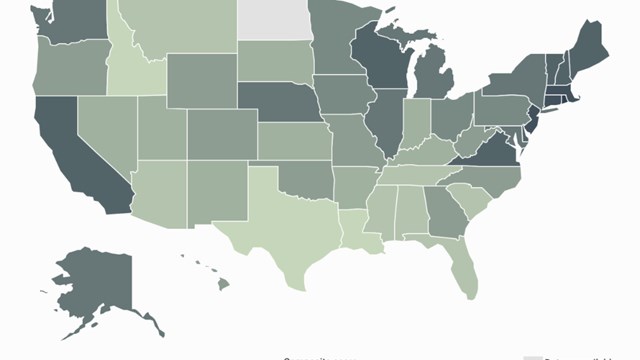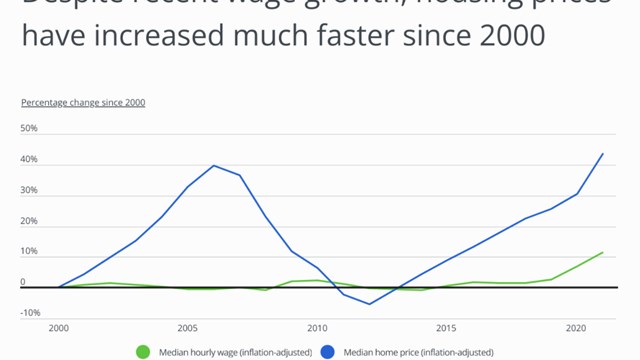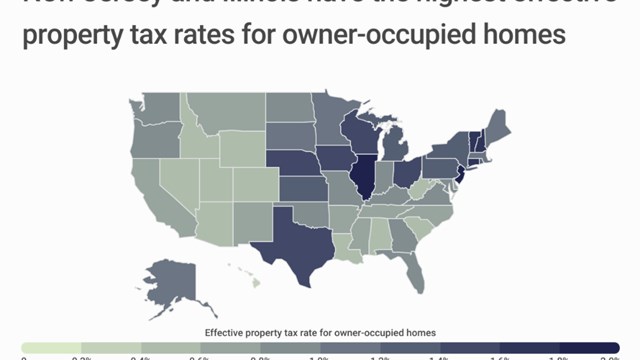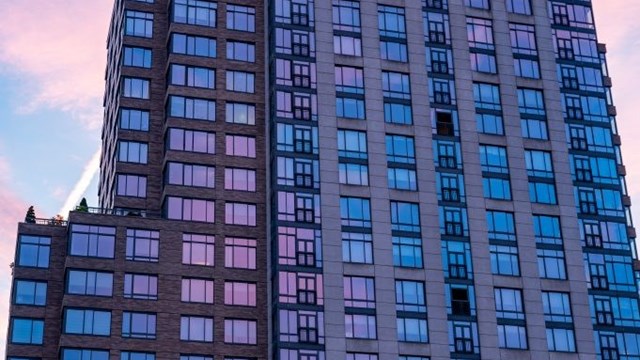In the world of single-family homes, property owners can do pretty much whatever they want when it comes to the look of their place. They can paint their house bright purple, for instance. Or display Christmas or Halloween decorations that are so bright or scary they may keep the neighbors up at night. Clearly, the community nature of co-op and condo living—particularly in urban multifamily buildings—puts some limits to these forms of self-expression in the name of visual continuity, taste, and property values. But can rules governing aesthetics collide with owners’ rights of free speech and expression?
A Fine Line
“One of the key differences between owning a single-family home and owning a condominium unit is the acknowledgement that in doing the latter, you give up some of your rights,” says Pamela Jonah, a partner at Marcus, Errico, Emmer & Brooks, a law firm based in Boston. “In terms of what may be placed in the common area yards and decks—specifically types of decorations—condominium associations and HOAs have what is commonly referred to as an ‘architectural integrity clause’ in their bylaws. This clause is meant to promote harmony in design and prevent any activities and modifications to the exterior aesthetic of the community that could detract from the community’s overall appearance or property values. Potential areas affected may include the outside common areas like doors, stoops, decks, patios, yards, or even sometimes the inside of the unit’s windows, if they can be seen from the outside.”
Creating a pleasing aesthetic environment is one of the primary functions of community associations. “When purchasing a housing unit in an association,” says Matthew Earle, a partner with Kates Farhi & Earle, a law firm located in Hackensack, New Jersey, “the owner is giving up certain rights, including the right to decorate as they would like—but in return [they’re] enjoying the community standards. Generally speaking, the association’s rules in this regard will be upheld by courts if they are authorized by the association’s governing documents or law, and if they do not violate some greater public policy. That said, associations should proceed very cautiously when it comes to restricting expressions of religion—such as the installation of a mezuzah on a door jamb—or political speech.”
Making the Rules
Rules for community aesthetics vary from association to association. Generally, they are enshrined in the governing documents and, of course, may be changed, altered, or amended by the board and/or community. “A condominium, co-op, or HOA has an interest in the look and feel of the building, as well as its safety,” says Hal Coopersmith, a partner with the law firm Coopersmith & Coopersmith, based in New York City. “These rules can vary from being strict to permissive in the ways that homes are constructed in a homeowners association to having a uniform look and feel for an apartment building in the case of a co-op or condo.”
“In a cooperative,” says Mark Einhorn, also a partner with Marcus, Errico, Emmer & Brooks, “the shareholders are tenants and occupy specific apartments under a proprietary lease or occupant agreement. This agreement typically has restrictions prohibiting modification of the common areas—which are the areas located outside the apartment. Likewise, generally speaking, there are also rules and regulations which would govern and restrict the posting of signs or decorations outside the apartments or which are visible from outside the apartment.”
“Appearance or similar architectural controls does have a purpose,” says Michael Kim, of counsel with Chicago law firm Schoenberg Finkel Beederman Bell Glazer, “which is to maintain or present an exterior impression of the building(s) which is believed, at least by the developer or architect, to be harmonious, impressive, or otherwise pleasing. The initial construction, materials, design, and color schemes would be an important attraction of the property to initial and subsequent purchasers. Thus, the guidelines and standards for maintenance of original buildings and even subsequent additions and modifications are meant to preserve that appeal.”
Free Speech vs. Community Rights
There is a looming question, though, as to whether a community’s attempt to control its own look and aesthetics infringes on the personal liberty of the residents and owners, particularly in the area of free speech.
“In order to implement the goal of maintaining a certain look of uniformity in an association,” says Jonah, “community boards will often enact rules that prohibit, among other things, lawn and window signs from being placed by owners. Up until recently, we would have unequivocally advised boards that they do have the authority to restrict the right to freedom of speech. Courts have historically recognized that only governmental agencies are required to protect constitutional rights. Condominiums are private property, and owners voluntarily buy their unit subject to the governing documents restrictions. Over time, though, courts have somewhat changed their view, finding condominium associations to be more of a quasi-government, which may have to recognize the constitutional rights—free speech in particular—that can impact the type of restrictions a board may impose. Still, to date, there is no Massachusetts appellate court case or Supreme Judicial Court case that specifically addresses whether a board may prohibit political signs.”
“The American flag is protected under the Freedom to Display the American Flag Act of 2005 passed by Congress,” says Einhorn. “The act protects residents’ right to display the American flag from any area that the resident has a separate ownership interest or a right to exclusive possession or use of. A cooperative would not be able to completely ban an owner from displaying an American flag from his or her apartment, so long as the size restrictions conformed with the protections under the federal act. Any other flag does not have the same protections, and that would include the POW flag.”
Earle explains that “As a general principle, the first amendment to the U.S. Constitution only prohibits governmental restriction on speech. However, New Jersey Constitutional protections are broader than those provided by the federal constitution—and in certain contexts, courts have extended free speech rights to override association restrictions. In interpreting the New Jersey Constitution, the New Jersey Supreme Court has noted that ‘it is the extent of the restriction [on free speech] and the circumstances of the restriction that are critical, not the identity of the party restricting free speech.’ In considering whether a restriction on speech should be upheld or overturned, a court should review (1) the nature, purposes, and primary use of such private property, generally, its ‘normal’ use, (2) the extent and nature of the public’s invitation to use that property, and (3) the purpose of the expressional activity undertaken upon such property in relation to both the private and public use of the property.’ In that context, New Jersey Courts have struck down restrictions on free speech in the context of association board elections and the posting of political signs on an owner’s own property.”
Under New York State law, says Coopersmith, “The first amendment to the U.S. Constitution protects the freedom of speech from government restriction, not by a private entity. A condominium, co-op, or HOA, though, can restrict speech and signage by virtue of its bylaws and house rules. Section 339-J does specifically allow for the display of an American flag not to exceed four feet by six feet in condominiums.”
Kim adds that “Technically/legally, the first amendment only applies to governmental action. However, in Illinois, the Condo Act has an express prohibition against rules in condo associations and even co-ops that infringe on first amendment rights under the U.S. and Illinois Constitutions. That application has been extended to freedom of religious expression—in particular the placement of mezuzahs on unit exterior door frames. As for ‘free speech,’ associations, like the government, can restrict speech in terms of time, manner and place, but not substance and/or content. Associations can restrict or even totally prohibit placement of political signs on common areas. Signs placed inside a unit but visible from the exterior probably cannot be prohibited. The Illinois Condo Act also expressly allows a unit owner to display the U.S. flag, a military flag of the U.S. armed forces, and the Illinois National Guard flag. Other types of flags are not so protected.”
In the final analysis, if the ability to display signage—or to festoon the outside of their unit with yards of holiday lights or a 12-foot plastic skeleton—is important to an individual, a homeowner’s association, condominium, or co-op simply may not be the best place for that individual to live. Restrictions on speech are among the many restrictions that an owner may have. While some people may not enjoy these restrictions, there may be many more who don’t want to be neighbors with someone whose signage they disagree with—or who has a 12-foot skeleton in their yard. There’s also an argument to be made for tolerance, at least until it becomes offensive.
CooperatorNews Staff Writer Alan Sidransky and Managing Editor Hannah Fons contributed to this article.










Leave a Comment